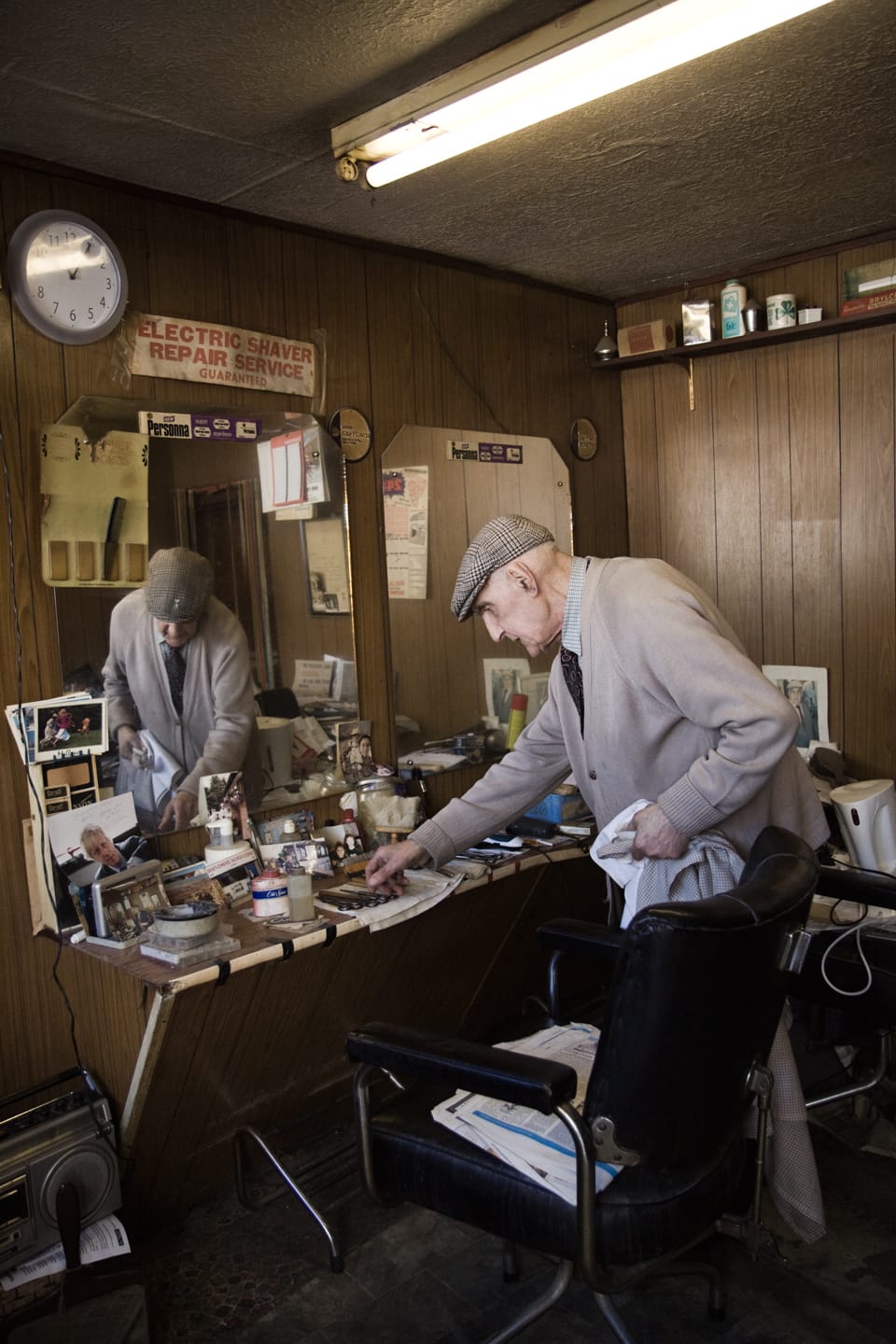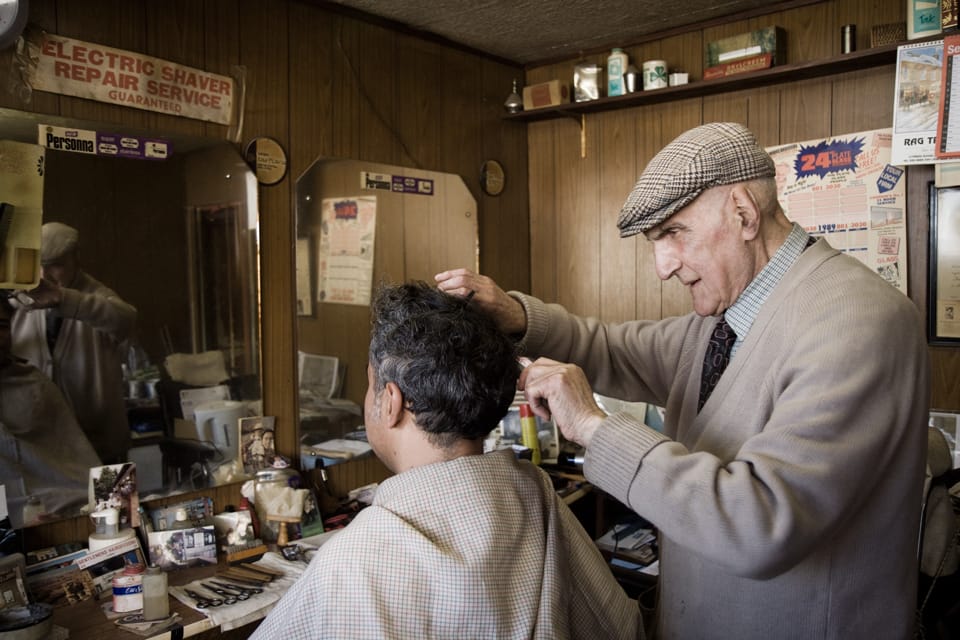The Barber Comes Around
When London’s Tottenham district fell to youth-driven chaos this past August, an elderly barber almost lost everything. Then other young people stepped in to keep him cutting.

London. Twenty-two Scotland Green. Standing behind his new front door in a small barbershop off Tottenham High Road, 89-year-old Aaron Biber sweeps up a pile of hair from where his floor tiles used to be. It is morning, unseasonably warm and quiet. The September sun creeps in through a fresh pane of shatterproof glass, and lights the tiny room. Two men pass through carrying painted-black pieces of wrought iron fence. The men are strong, but they struggle. Even divided into pieces, iron is very heavy, resistant to human force, effective.
It has been nearly two months since rioters smashed through Biber’s doors and windows and tore his 41-year-old shop to pieces, nearly two months since they finally stopped, and went away.
“They took everything,” Biber says, seated in the only working barber chair in the center of the room, listening to American country music from the 1960s. “The hairdryer, the cotton wool container, a bottle of spirit I’ve had since 1940 ... Cups, sugar, coffee ... They even took my kettle,” he says.
A veteran of World War II, Biber grew up in London’s East End. He started working odd jobs at the age of 10 and cutting hair when he was 12. “We were all poor down in the East End,” he says. “Everybody helped each other. Nobody interfered. There were all different nationalities there and nobody interfered with nobody. They all lived together.”
“They took everything. The hairdryer, the cotton wool container, a bottle of spirit I’ve had since 1940. Cups, sugar, coffee. They even took my kettle.”
When given the option, Biber always chose to be paid in food so that his family would have something to eat at night.
This morning, Biber sits in a beam of sunlight and looks out the window of his empty shop. He wears a tweed flat cap with a silver pin stuck through the top, a baggy brown sweater over a white and blue patterned shirt, a navy tie with the Star of David pinned to it, black slacks, black shoes. His barbershop tools are arranged neatly under two cloudy mirrors on a cluttered countertop to his right. He smokes hand-rolled cigarettes and plays Jim Reeves cassettes because they calm him. “Have I Told You Lately That I Love You” spins through a tape deck and out a small speaker because Biber thought to take his radio home the night before the looters came, and so it’s still here, still works like a charm.
Biber spends a lot of his mornings like this. He doesn’t do much business anymore, not since the riots.
“People are afraid to come around,” he says.
It was a Saturday night when Tottenham dissolved into a battleground, falling like a match from civilization and painting the August skyline gray and gold. The violence began after protests over the fatal police shooting of a 29-year-old. Demonstrators had marched peacefully to the Tottenham police station to demand justice for the killing, but they were largely ignored. People’s frustrations grew. The first bottle sailed through the air. The first fire was lit shortly after the sun slipped beneath the horizon.
Throughout the night, vehicles and shops were set alight. Looters and riot officers clashed in the streets. Petrol bombs were hurled at police. Fifty-five civilians were arrested. Twenty-six police were injured. Firefighters battled 49 fires and received over 250 public emergency calls.
Panic.
By dawn on Sunday, Tottenham High Road was reduced to a sea of concrete and broken glass. Plumes of smoke rose from the charred skeletons of buildings.
The daylight brought only a brief and sketchy solace, a warning from a city only temporarily restored.
“I couldn’t believe it,” Biber says of his return to the shop that day. “I couldn’t sleep for three nights.”
Last year, Biber lost his wife. And with no insurance or money for repairs, he assumed that, this year, it would be his barbershop, his livelihood.
The windows and doors were smashed in. The walls and floors were torn apart. The place had been gutted. Looters had run off with everything from ashtrays to old chairs, but left behind decades of lonely, dusted relics; all a little violated and sitting just slightly out of place. But Biber’s cutting tools, his trove of steel treasures, survived the attack. Along with his radio, he’d taken them home for the night. In case he was robbed.
Biber’s nephew and neighbors helped him sweep the pavement around his shop on that dingy Sunday. They cleaned up the inside the best they could, boarded up the doors and locks, and hoped for the best.
By dusk, the riots were alive again, spreading like wildfire and setting the city ablaze. Scattered stretches of London burned for four more nights, as policed struggled to contain the protests.
But somewhere within their brute and complex layers, community support efforts began to breathe and swell.
Within days, interns working with BBH Labs, a British advertising agency, set up a fundraising campaign for Biber. The Keep Aaron Cutting campaign was started as part of the agency’s Barn program, aimed at working with young people to use advertising for the greater good.
Interns Bjorn Conrad and Sophie Browness were touched by Biber’s story and saw a chance to use the internet and social media to help him.
“Aaron’s story was really symbolic of how ridiculous the riots were,” Conrad says. “There was nothing there worth stealing. But they came in anyway and ruined an old man’s livelihood.”
“Aaron’s story was really symbolic of how ridiculous the riots were. There was nothing there worth stealing. But they came in anyway and ruined an old man’s livelihood.”
Biber opens his shop at 6 a.m. each day. From then until the early afternoon, he draws a kind of sustenance from within its wood-paneled walls, and from those who come inside.
“Aaron has a lot of regulars that don’t come in for a haircut,” Browness says. “They just come in to sit with him, or to have a cup of tea.”
“His customers are his mates,” Conrad says. “He doesn’t care about the money. He cares about the people.”
After the riots, Biber’s story spread to media outlets across the world. He began receiving letters of support from complete strangers; some even had a few pounds taped to the inside. Little by little, people sent what they could. And within a week, the money began to overflow.
The Keep Aaron Cutting campaign closed in just four days after raising £35,000. More than enough. Whatever money Biber doesn’t need will go toward helping others in the area.
The repairs began in September and there is still much to do. But amid the restoration, Biber continues to open his shop each morning. He does only a couple of haircuts a day, but it’s reason enough.
Standing today over a panorama of wooden handles and silver blades, he holds his new hairdryer up to an old pair of clippers. “You have to warm them up first,” he says. “That’s the secret.”

He shares a few more.
He talks about the war, and about meeting Eleanor Roosevelt. He talks about guarding Tower Bridge with a spigot gun and rifle, and receiving Churchill’s orders to “shoot the bastards ... save the bridge.” He talks about his penchant for the 1930s, for big bands and John Wayne. He lights up a little when he hears the name Johnny Cash. He talks about eras, and people, and politicians, and where they have gone wrong. He talks a lot about work ethic, and how he believes it is a lack of one that ultimately destroyed his barbershop. He talks about being the son of a Polish immigrant, and he repeats the words that his father always used to.
“Arbet makht dos lebn zis,” Biber says. “Work makes life sweet.”
